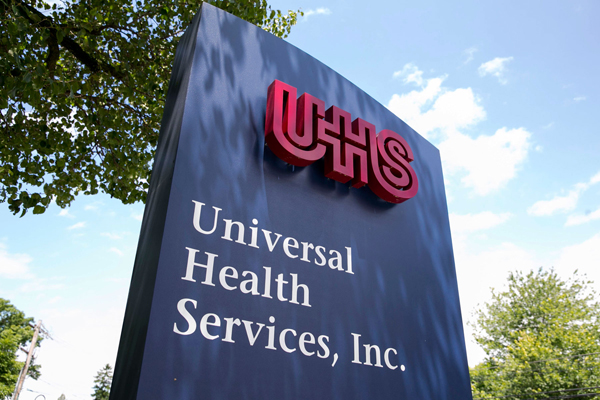By CCHR International
The Mental Health Industry Watchdog
August 17, 2016
Citizens Commission on Human Rights (CCHR) calls on Pennsylvania legislators to intervene in the recently announced plan by University of Pennsylvania’s Lancaster General Health to allow the Universal Health Services (UHS) to operate a $30 million psychiatric hospital in Lancaster that is expected to open in two years.[1] Twenty-six of UHS’s behavioral facilities in nine states, including three in Pennsylvania and, additionally, UHS headquarters in King of Prussia, are under federal criminal investigation over Medicare and Medicaid billing. Yet, a Lancaster General spokesperson believes these would not cause UHS “to be unable to fulfill all of its obligations to us and to our community.”[2]
CCHR says this shocking and reckless comment about the allegations leveled at billing practices and psychiatric “care” under UHS’s behavioral sector warrants intervention to protect Lancaster residents from potential abuse. CCHR charges that systemic abuse has been uncovered in the for-profit psychiatric industry. State legislators and law enforcement officials have already been notified of the many concerns about UHS’s behavioral sector. As such, no additional psychiatric/behavioral facilities should be approved until all allegations against the company’s psychiatric division—including against psychiatrists employed of affiliated with it, are resolved.
- Government inspectors investigating patient complaints cited 44 of UHS’s hospitals in 23 states for dangerously poor care or unsafe conditions between 2012 and mid-2015, according to a Dallas Morning News article. Inspectors also found serious problems at 8.4% of UHS hospitals in 2014 compared to a nationwide figure of 3%—more than double the rate of other facilities. A representative of the U.S. Centers for Medicare & Medicaid Services (CMS) said the numbers reveal “that ‘patient complaints against the company aren’t just isolated to one region, but extend across the country.’”[3]
- The News Journal in Illinois reported this year that the multi-agency federal government is investigating not only government insurance billing, but also “allegations of negligence and staff retaliation.”[4]
- In 2010, hundreds of serious incidents at The Meadows in Central Hall were not reported to the Patient Safety Authority and Department of Health, as required by law, including 25 sexual abuse allegations and 12 self-inflicted injuries, including 6 suicide attempts.[5]
-

Government inspectors investigating patient complaints cited 44 of UHS’s hospitals in 23 states for dangerously poor care or unsafe conditions between 2012 and mid-2015.
In December 2012, the CMS cited UHS’s Fairmount Behavioral Health in Philadelphia over staff failing to assess a patient kept in full leather restraints for nearly 2 ½ hours.[6] Within seven months, Fairmount was again cited for improper use of restraints and failing to assess a patient held in restraints for 4 ½ hours.[7]
- Psychiatrists affiliated with Pennsylvania behavioral facilities clocked up millions of dollars in Medicare Part D prescription costs. Three had retail costs of $1.7 million in 2013 alone, of which one accounted for more than $1 million. The latter represented 688% above PA average and his total number of prescriptions, including refills was 985% above the PA average.[8]
In June 2015, Congressmen Danny Davis and Joe Kennedy III wrote to CMS requesting the agency speed up its investigation into UHS.[9] They cited “troubling allegations of misconduct, negligence and employee intimidation” and how “reports detail claims of violence, sexual assaults, patient runaways and lack of security staff at UHS facilities in Illinois and Ohio….”[10] For example:
- From July-November 2014, Rock River in Illinois had the highest rate of youths manually restrained by staff at a rate that was nearly eight times the median for all state facilities.[11] In September 15, five plaintiffs filed a lawsuit against Rock River, alleging sexual abuse and rape by staff.[12]
The allegations are not limited to Illinois and Ohio.
- Milton Girls Juvenile Residential Facility in Florida closed in 2012 following incidents of staffers being criminally charged with abusing teens.[13]
- In 2010, Dr. Harold E. Smith, a psychiatrist working at Central Florida Behavioral Hospital prescribed excessive amounts of a painkiller to a 51-year-old patient, Alice Tomlinson, killing her.[14] Smith had a long history of his own substance abuse. In 2014, he surrendered his Florida license and the following year, a jury ordered a $12.5 million verdict against Smith and the UHS facility over Alice Tomlinson’s wrongful death. The jury found Smith 85% negligent and Central Florida Behavioral Health 15% responsible.[15]
- In January 2016, UHS announced that it would be closing its National Deaf Academy (NDA) Behavioral Health System in Mt. Dora, Florida. NBC News reported the NDA closure occurred after the facility was “hit with abuse allegations,” including at least 10 patient complaints about abuse, three families filing lawsuits and the FBI investigating it.[16]
The For-Profit Psychiatric Industry
The New York Times reported a study which found that patients’ mortality rates spiked when nonprofit hospitals switched to become profit-making, and their staff levels declined: “These profit-maximizing tactics point to a troubling conflict of interest that goes beyond the private delivery of health care. They raise a broader, more important question: How much should we rely on the private sector to satisfy broad social needs?”[17]
Yet, Lancaster General plans to rely upon UHS. In February 2016, Yahoo! Finance reported, “one of the fastest-growing subsets of healthcare is mental health and addiction treatment, often combined under the umbrella moniker ‘behavioral health.’”[18]
UHS reports it receives Medicaid revenues in excess of $90 million annually from Pennsylvania.[19] Behavioral health contributes about 51% of the total company revenues.[20] Investors were told that reducing staffing costs and keeping occupancy high helps the company stay profitable.[21]
Acadia, the behavioral healthcare competition for UHS, received 38% of its reimbursement for services from Medicaid and 19% from Medicare in 2014.[22] The company describes the investment environment for behavioral facilities as a “large market with attractive trends.” It estimated that the Child and Adolescent Behavioral Healthcare market alone reached $11 billion in 2014.[23] Nearly all of Acadia facilities’ Medicaid payments relate to the treatment of children and adolescents. A public record filed online states, “children and adolescents are a patient class that is less susceptible to reductions in reimbursement rates.”[24]
The Lancaster UHS mental health facility plans could include a “child unit.”[25]
This also raises concerns about psychotropic drug use in not only UHS psychiatric facilities but also other for-profits in this sector.
- A sample of 45 UHS-facility-affiliated psychiatrists had Medicare Part D prescription costs retailing at $40.7 million in 2013 and 71% of these were among the top 25 prescribers of psychotropic drugs in their respective states. Ten were the top ranked prescribers for the potentially dangerous antipsychotics: clozapine, Seroquel XR, Invega, Invega Sustenna and generics of Risperdal, Zyprexa and Geodon; antidepressants such as Pristiq XR and Vyvanse; and the generic of the psychostimulant Adderall.
- In a sample of 12 psychiatrists affiliated with Acadia behavioral facilities in 9 states, seven were top state prescribers of psychotropic drugs and together amounted to $3.68 million in Medicare Part D prescription retail costs in 2013—an average of more than $525,000 each. Of these, two were among the top 20 prescribers of Suboxone (buprenorphine-naloxone), a potentially addictive drug prescribed to treat opioid and other drug abuse.
Psychiatric drugs are lucrative. Forbes reported that in 2014, investors poured $3.3 billion into firms that are developing drugs for psychiatric “illnesses”—more than in any of the last 10 years. [26]
Likewise, several UHS behavioral facilities acknowledge being sites used for clinical drug trials. It begs the question whether the new UHS behavioral clinic in Lancaster could be used for research conducted by the University of Penn’s Department of Psychiatry. Newly appointed chair of the department, Maria A. Oquendo, (who will be beginning the new role in January 2017), is the current president of the American Psychiatric Association (APA), an organization federally investigated for its conflicts of interest with psycho-pharmaceutical companies. She is a long-term researcher, continuously funded by the National Institute of Mental Health (NIMH).[27] Although she chaired the APA’s Conflict of Interest Committee, she has also been a consultant for Pfizer, and has received unrestricted grants and/or lecture fees from AstraZeneca, Bristol-Myers Squibb, Eli Lilly, Janssen, Otsuka, Pfizer, Sanofi-Aventis, and Shire. Her family owns stock in Bristol-Myers Squibb.[28] As of 2012, her spouse was a full time employee of Bristol-Myers Squibb.[29] Uni of Penn receives hundreds of millions of dollars in Federal funds for research.[30]
A legislative investigation should be undertaken to determine how the decision to award UHS the joint venture for operating behavioral-health hospital planned in Lancaster City was determined. [31] Such an investigation should especially review what evidence was relied upon to reassure Lancaster authorities that that the allegations of neglect and psychiatric abuse against UHS’s behavioral sector would not be a threat to patient safety when the new unit is operational.
References:
[1] “Universal Health to operate behavioral facility for Lancaster General,” Philly.com, 11 Aug. 2016, http://www.philly.com/philly/business/20160812_Universal_Health_to_
operate_behavioral_facility_for_Lancaster_General.html
[2] Ibid.
[3] Miles Moffeit, “Danger in the psych ward: Safety issues plague a chain of mental-health hospitals in Texas and across the United States,” Dallas Morning News, 18 Mar. 2016.
[4] Margie Fishman, “Feds authorize state probe of suicide outside Rockford,” The News Journal, 12 Apr. 2016, http://www.delawareonline.com/story/news/2016/04/11/fed-authorizes-state-investigation-rockford-suicide/82911130/
[5] “Hundreds of Serious Incidents Not Reported and Younger Children Boarded With “Known Pedophiles”,” UHS Behind Closed Doors, 30 Dec 2010, http://uhsbehindcloseddoors.org/complaint_type/hundreds-of-serious-incidents-not-reported-and-younger-children-boarded-with-known-pedophiles/; http://uhsbehindcloseddoors.org/wp-content/uploads/2014/05/PA.The-Meadows-2010.12.30.pdf.
[6] Statement of Deficiencies and Plan of Correction, Pennsylvania Department of Health and Human Services, Fairmount Behavioral Health System, 21 Dec 2012.
[7] Statement of Deficiencies and Plan of Correction, Pennsylvania Department of Health and Human Services, Fairmount Behavioral Health System, 10 Jul 2013.
[8] http://doctors.healthgrove.com/l/614583/Punyabrata-Roy-I-in-Centre-Hall-Pennsylvania.
[9] http://kennedy.house.gov/sites/kennedy.house.gov/files/06.23.15.UHS%20Letter.pdf; http://www.chicagotribune.com/news/watchdog/rtc/ct-psychiatric-provider-investigation-watchdog-met-20150623-story.html
[10] “Congressman Kennedy Pushes HHS on Investigation Into Mental Health Network,” Press Release, 23 June, 2015, https://kennedy.house.gov/media/press-releases/congressman-kennedy-pushes-hhs-on-investigation-into-mental-health-network
[11] “Center for troubled girls will close, cites decision by DCFS,” Chicago Tribune, 28 Jan. 2015, http://www.chicagotribune.com/news/watchdog/rtc/chi-youth-treatment-rock-river-20150128-story.html
[12] Lorraine Bailey, “Severe Abuse Alleged at Illinois Home for Girls,”Courthouse News.com, 10 Sept. 2015, http://www.courthousenews.com/2015/09/10/severe-abuse-alleged-at-illinois-home-for-girls.htm
[13] “Abuse of Girls at Milton Detention Facility Exposes Flaws in Florida’s Juvenile Justice,” Flagerlive.com, 18 Dec, 2012, http://flaglerlive.com/48291/milton-detention-abuse/; “Juvenile Prison Guard’s Savage Attack On 15-Year-Old Girl Caught On Camera,” News One, 13 Dec. 2012, http://newsone.com/2102624/shannon-linn-abbott-florida-milton-girls-juvenile-residential-facilities/
[14] Jeff Schweers, “Medical board votes to reprimand UF professor with checkered past,” The Gainsville Sun, 9 Dec. 2013, http://www.gainesville.com/article/20131209/ARTICLES/131209614?p=2&tc=pg
[15] Jeff Schweers, “UF faculty member with checkered past faces state scrutiny,” The Gainsville Sun, 2 Dec. 2013, http://www.gainesville.com/article/20131202/ARTICLES/131209947
[16] Aliza Nadi, “National Deaf Academy, Hit with Abuse Allegations, Is Closing,” NBC News, 15 Jan. 2016, http://www.nbcnews.com/news/us-news/national-deaf-academy-hit-abuse-allegations-closing-n497516
[17] Eduardo Porter “Health Care and Profits, a Poor Mix,” The New York Times, 8 Jan, 2013.
[18] http://finance.yahoo.com/news/2-ways-invest-11-billion-183000979.html;_ylt=A0LEVvL_h55XYlcABwgnnIlQ;_ylu=X3oDMTE
0a3NwdjNyBGNvbG8DYmYxBHBvcwM3BHZ0aWQDRkZVSTNDMl8xBHNlYwNzcg.
[19] http://biz.yahoo.com/e/150508/uhs10-q.html.
[20] http://marketrealist.com/2015/01/assessing-universal-health-services-revenue-mix-admissions/.
[21] http://uhsbehindcloseddoors.org/wp-content/uploads/2015/03/SEIU-Report-UHS-Behind-Closed-Doors-2015-03-17.pdf, p. 2.
[22] https://www.sec.gov/Archives/edgar/data/1520697/000119312515069793/d854534d10k.htm.
[23] Acadia Healthcare, Investor Presentation, 2015, p. 13.
[24] https://www.sec.gov/Archives/edgar/data/1520697/000119312515069793/d854534d10k.htm
[25] Andrew Forgotch, “Lancaster General Health plans new mental health facility,” ABC News, 2 May 2016, http://abc27.com/2016/05/02/lancaster-general-health-has-plans-for-a-new-mental-health-facility/.
[26] Matthew Herper, “The Coming Boom in Brain Medicines,” Forbes, 11 Feb. 2015, http://www.forbes.com/sites/matthewherper/2015/02/11/brain-boom-the-drug-companies-bringing-neuroscience-back-from-the-brink/#57f5f64352a2.
[27] http://www.uphs.upenn.edu/news/News_Releases/2016/03/oquendo/.
[28] Barnhill, John W., ed. DSM-5 Clinical Cases, (American Psychiatric Publishing, Arlington, VA), 2014, pg. xxiii, https://books.google.com/books?id=i6STAwAAQBAJ&pg=PR23&lpg=PR23&dq=Maria+A.+Oquendo+Janssen&source
=bl&ots=jfxBkmMa1w&sig=LhVG0P0hBIhUbrODKFW18GwmGzs&hl=en&sa=X&ved=
0ahUKEwjav5D84bzOAhUW1GMKHdCNB-AQ6AEIMjAD#v=onepage&q=Maria%20A.%20Oquendo%20Janssen&f=false.
[29] Robert I. Simon, MD, Robert E Hales, MD, MBA, The American Psychiatric Publishing Textbook of Suicide Assessment and Management, Second Edition, (American Psychiatric Publishing, Arlington, VA) 2012, https://books.google.com/books?id=L5-vBAAAQBAJ&pg=PR13&lpg=PR13&dq=Maria+A.+Oquendo+Janssen&source=
bl&ots=cS_IMjJzSR&sig=1e_wuL1jgnKAWCD_4BT-W8TIYDE&hl=en&sa=X&ved=0ahUKEwjav5D84bzOAhUW1GMKHdCNB-AQ6AEIVzAN#v=onepage&q=Maria%20A.%20Oquendo%20Janssen&f=false; https://www.psychiatry.org/about-apa/meet-our-organization/board-of-trustees/maria-oquendo.
[30] http://faseb.org/viewer.aspx?id=361&Name=Value-of-NIH-Funding-in-Pennsylvania.pdf; http://www.eurekalert.org/pub_releases/2010-09/uops-pr090710.php.
[31] http://lancastergeneralhealth.org/LGH/News-Home/News-Room/News-Releases/2016/Lancaster-General-Health-selects-Universal-Health.aspx.



